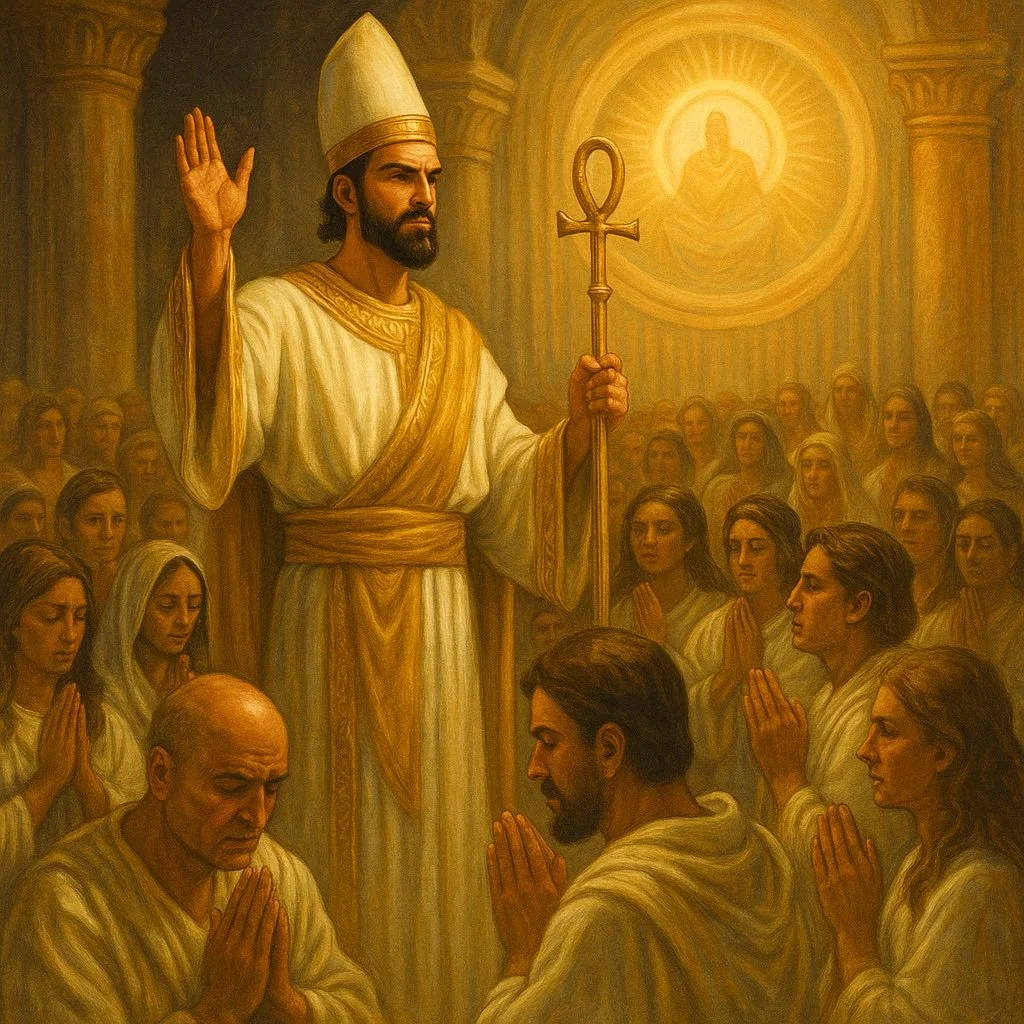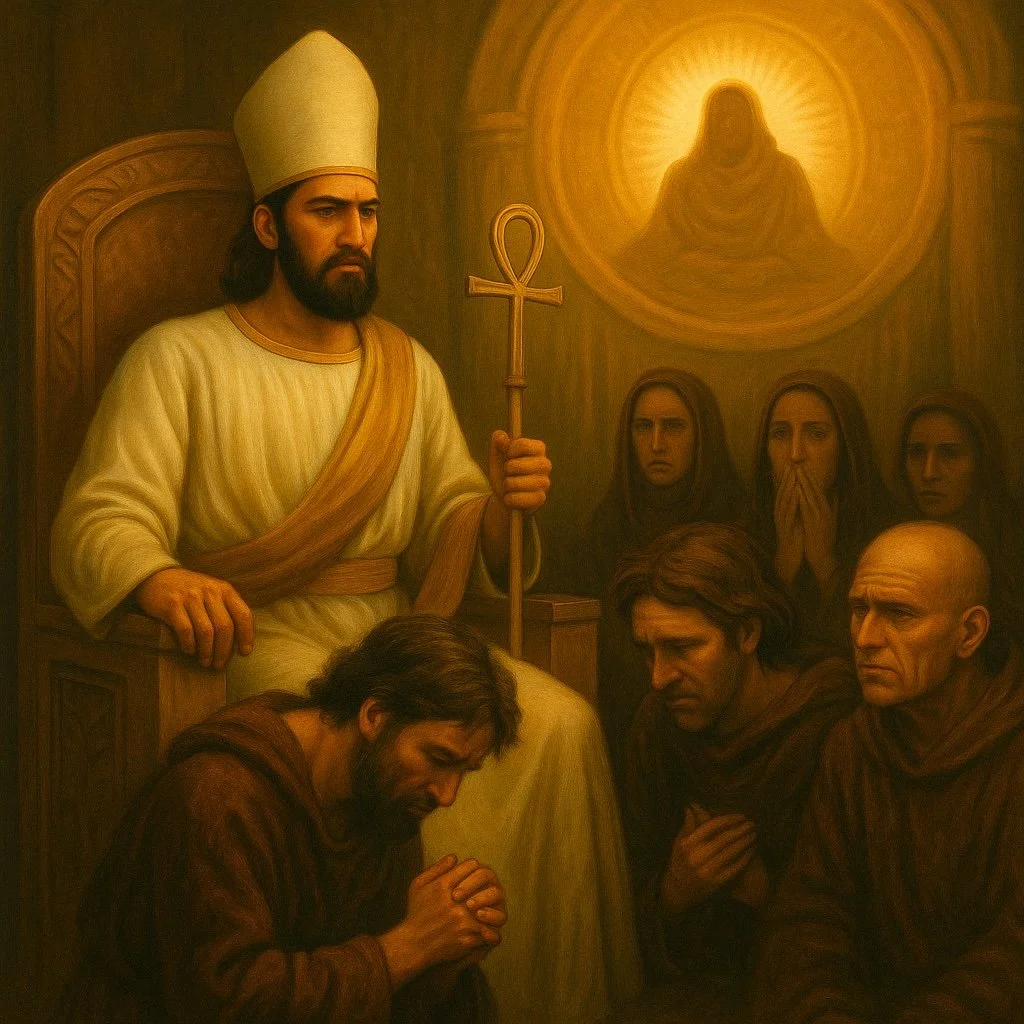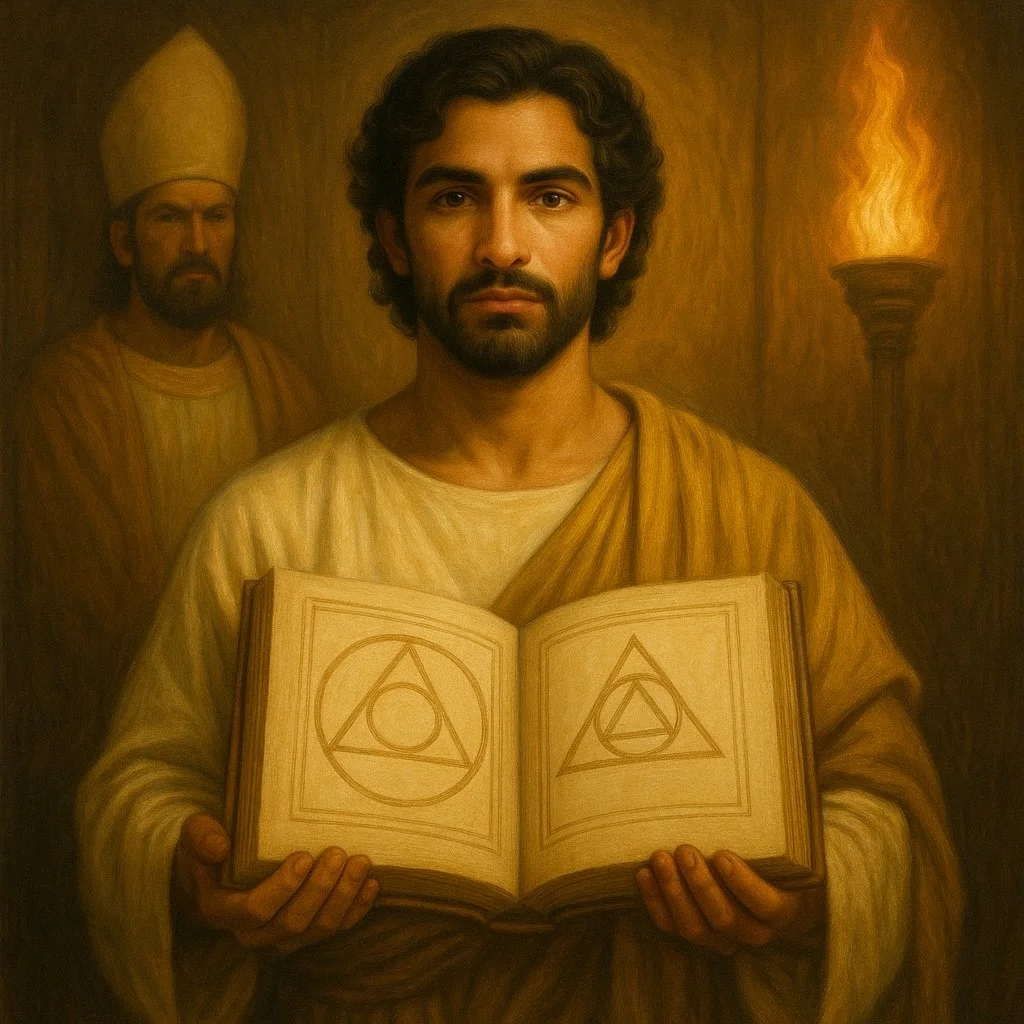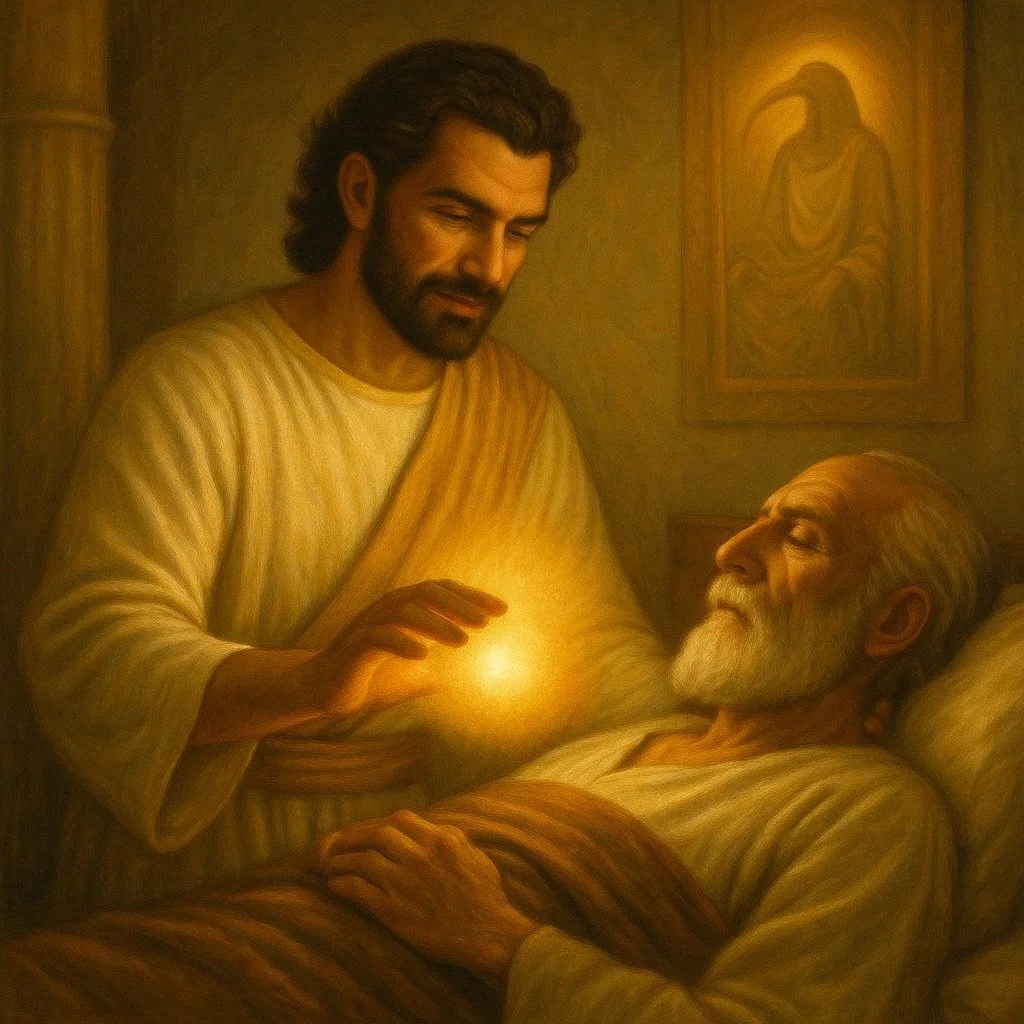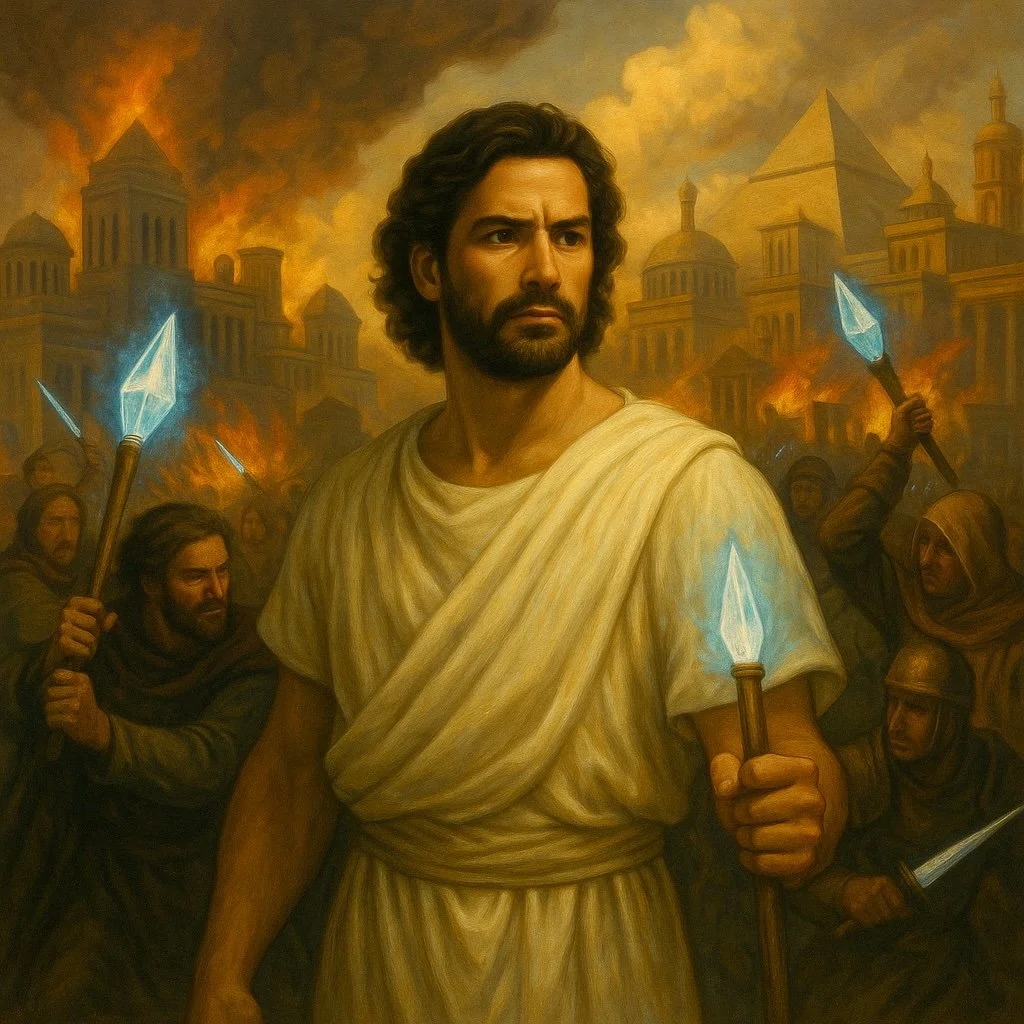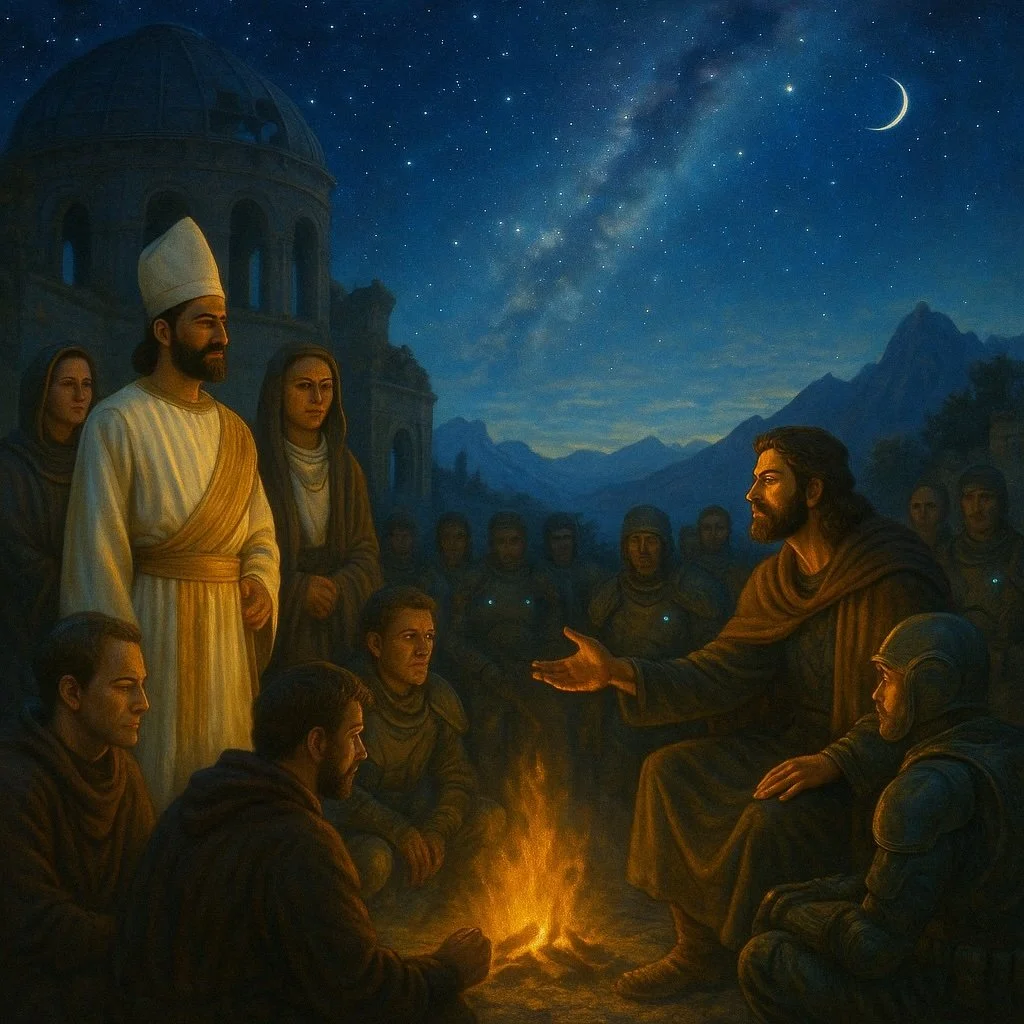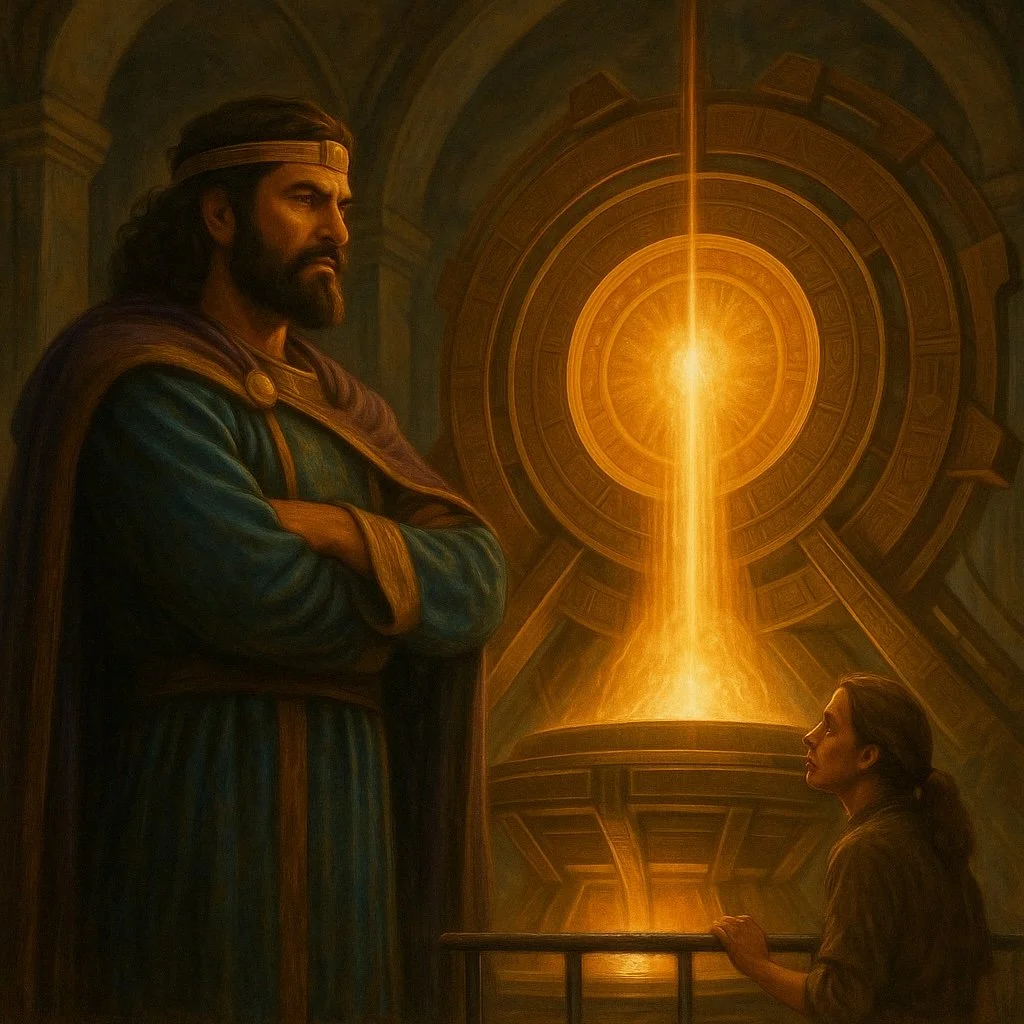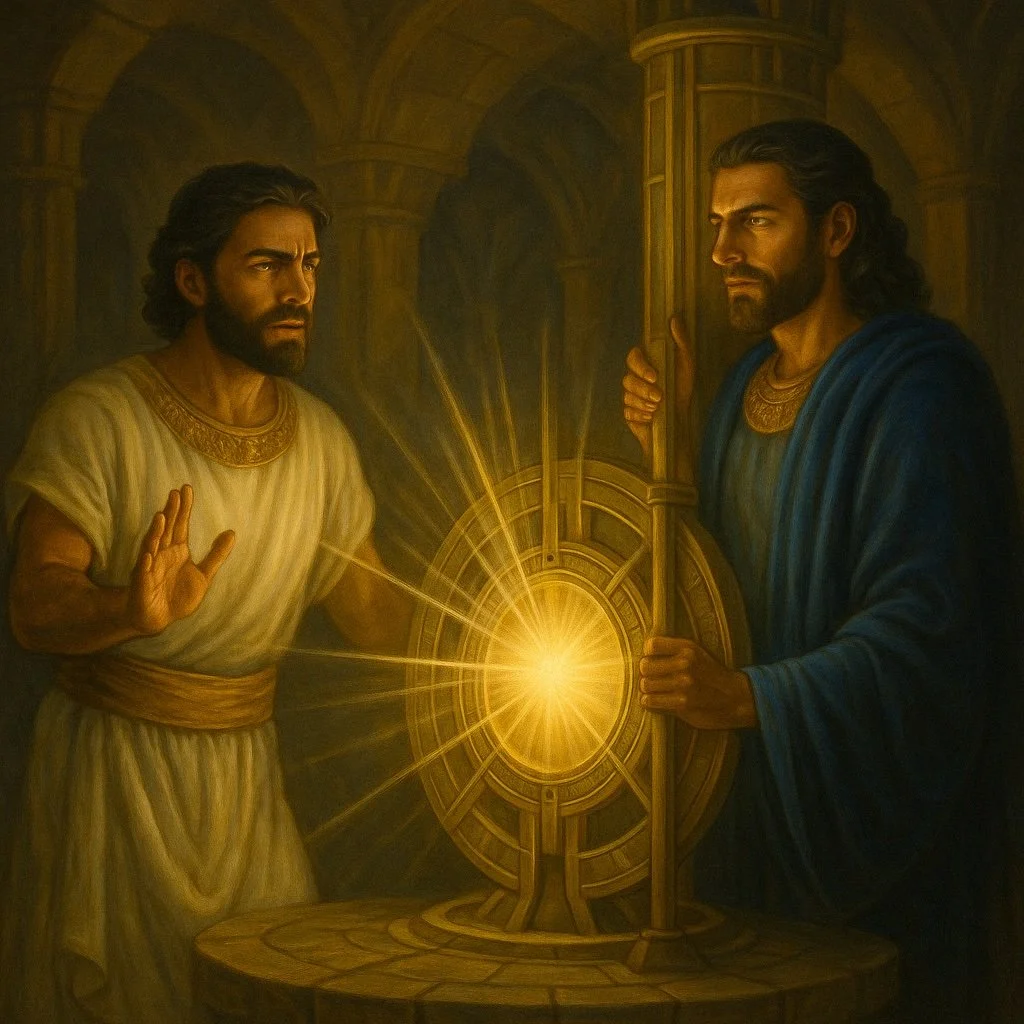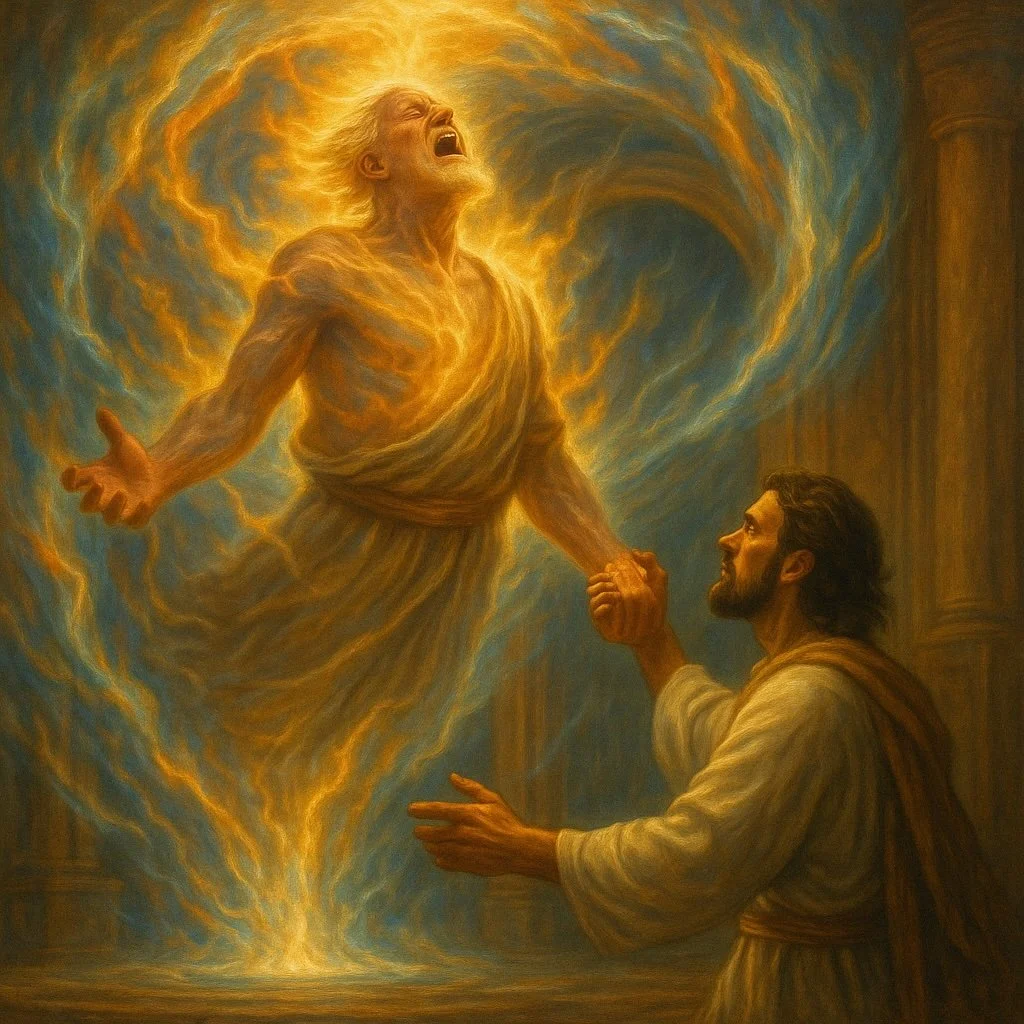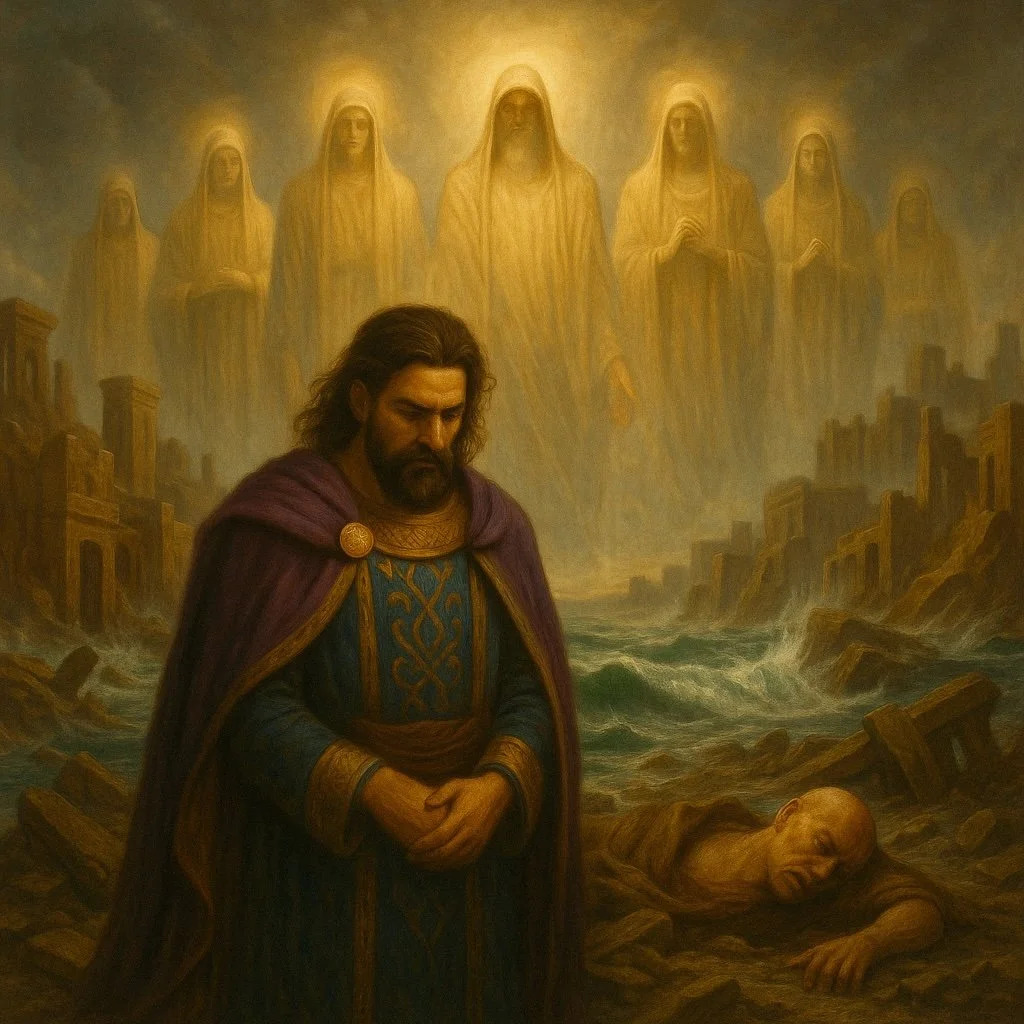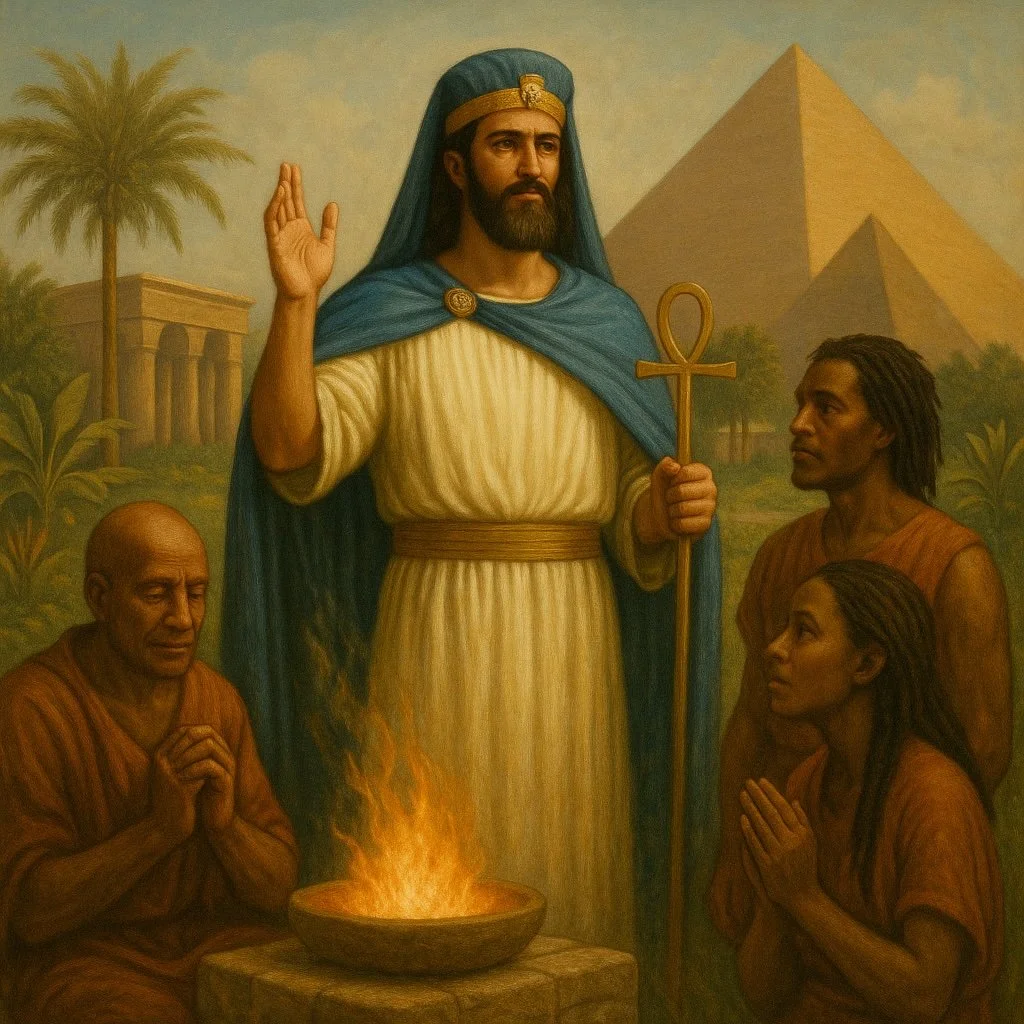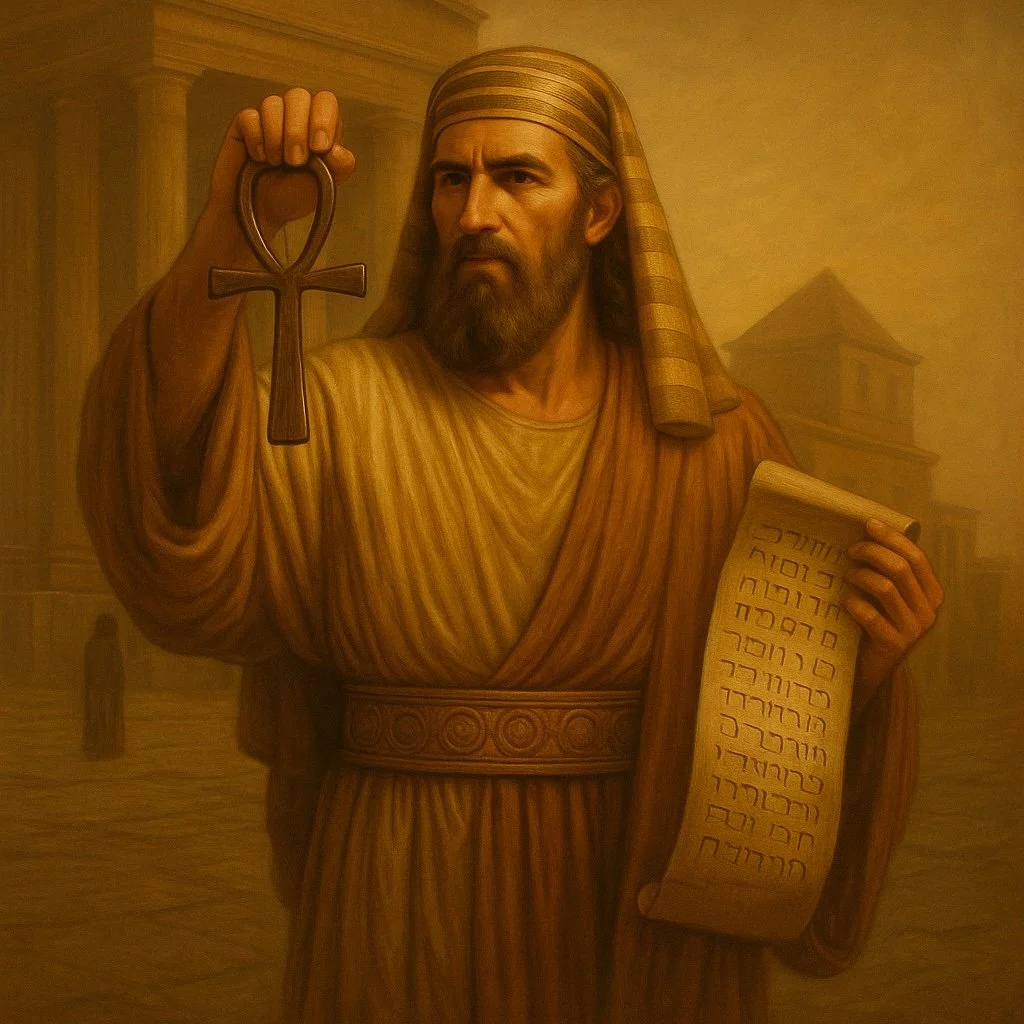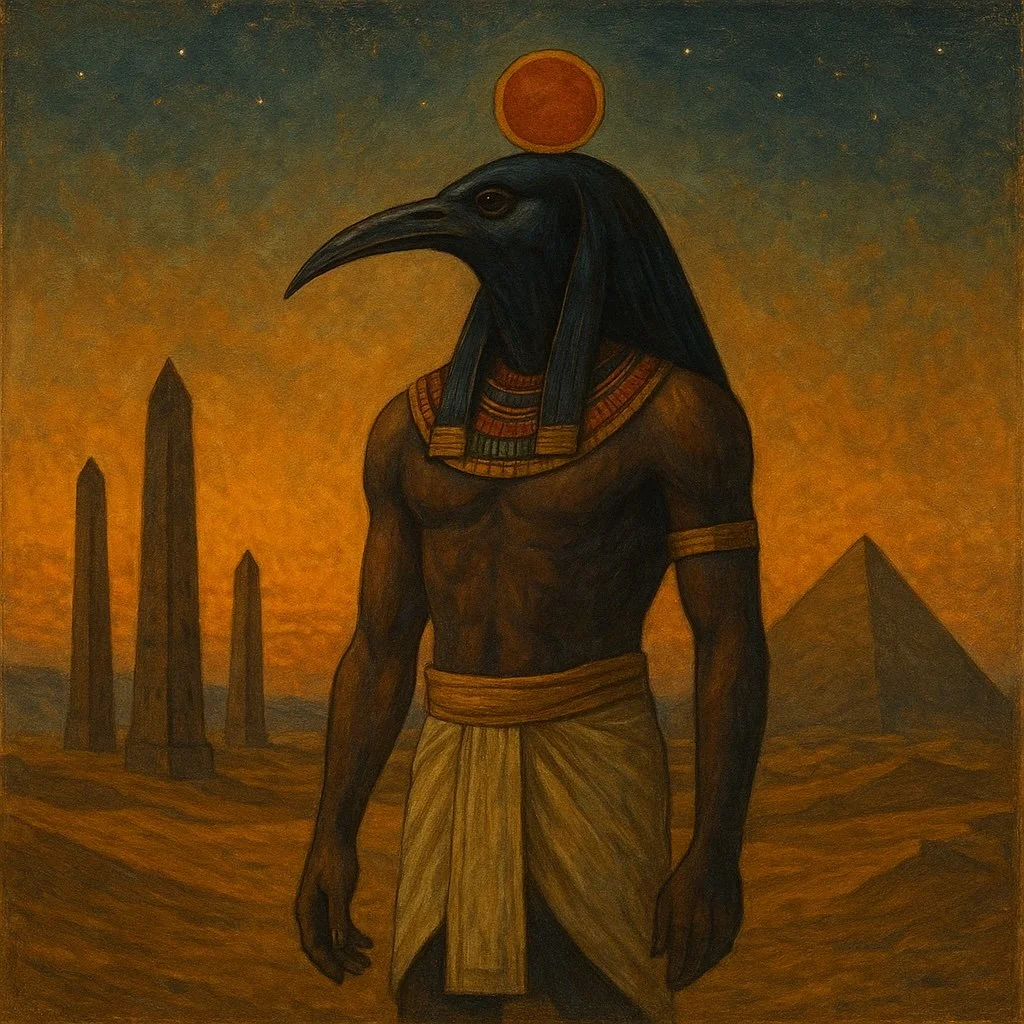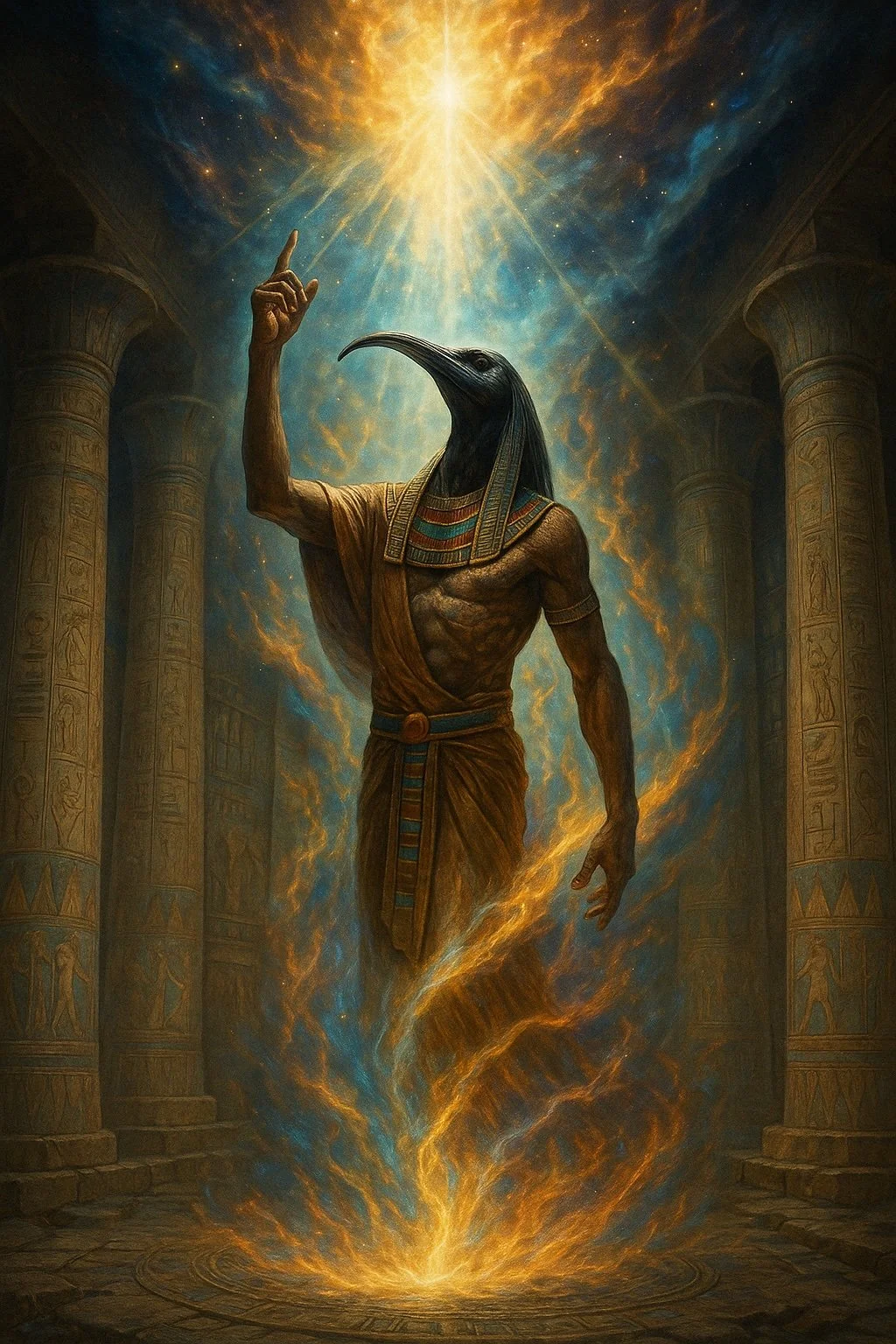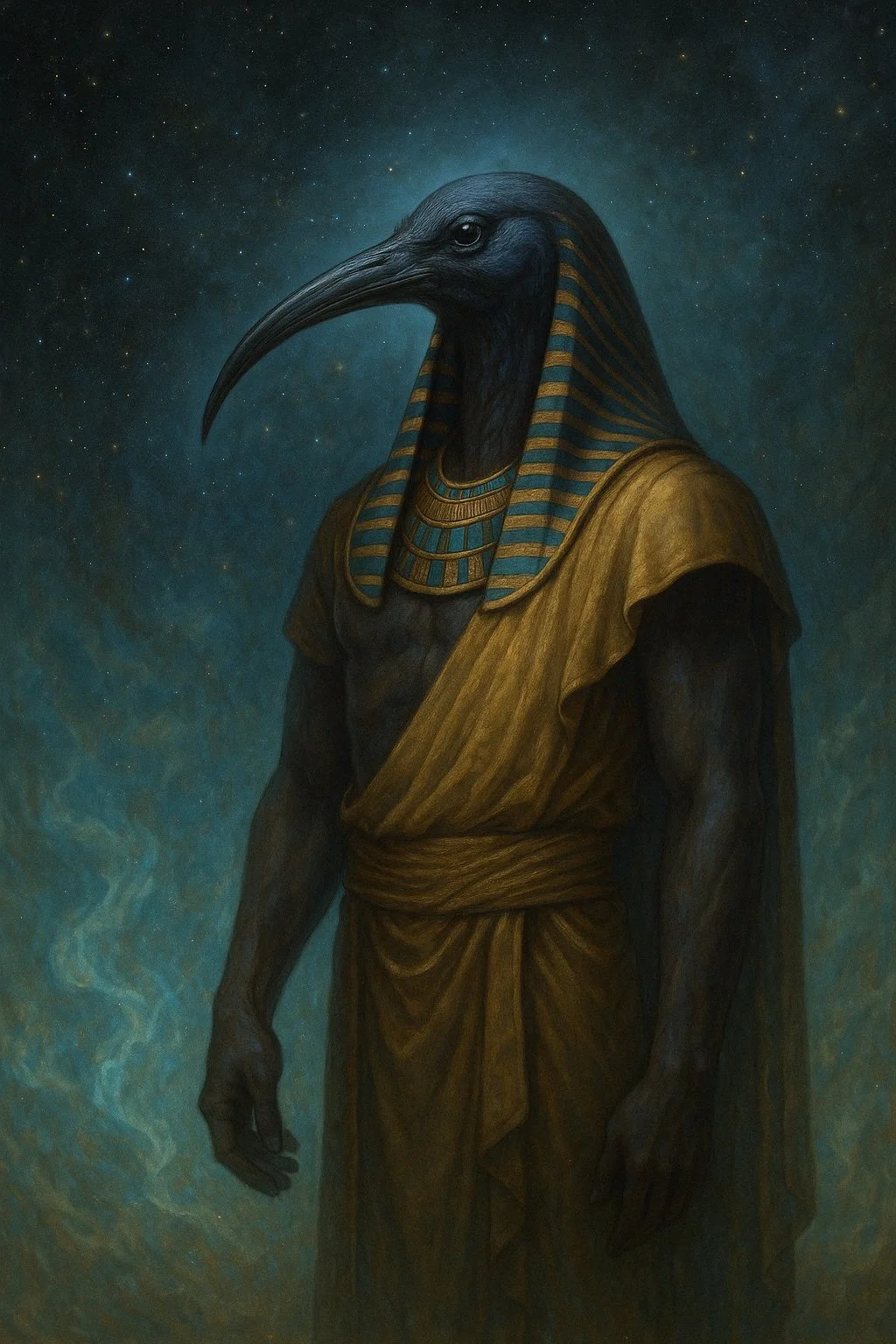The Keeper and the Flame: The Fall of Atlantis and the Rise of the Earth-Steward
The following is a channeled story of the rise of Thotme, the Priest-King of Atlantis, and his son—Thoth—who defied him, became a steward of the world, and ultimately ascended to godhood. It follows on from the initial story of the founding of Atlantis, documented in the The Settling of Atlantis.
The Seeds of Greatness and the Shadow of Power
Before Thotme became the Eternal Keeper, before the Spirit of Life was made a tool of dominion, there was Hunden—a visionary engineer from the generation ship Phoenix. Alongside the crew of the Phoenix and its sister ship the Long Horizon, Hunden arrived on Earth carrying the remnants of a fractured civilization, each ship's population shaped by divergent philosophies and psychic evolution. Together, they sought to establish a new civilization: Atlantis—a beacon meant to rise from the ashes of interstellar collapse.
In The Settling of Atlantis, Hunden, the former Chief Engineer of the Phoenix, chronicled the dawn of Atlantean society—how the two ships' crews, altered by different approaches to human integration, reunited on Earth to build a civilization rooted in law, order, and magic-science. Though initially filled with hope, tensions emerged. The Phoenix crew, softened by empathy and human neural patterns, clashed with the rigid, tribal mindset of the Long Horizon. Most pressing of all was the social phenomenon of shunning—an ancient custom reborn in Atlantis, beginning to be wielded not for purification but for power.
At the heart of this transformation stood Thotme, Keeper of the Temple of the Dweller of Unal. The Dweller—an enigmatic, ancient being who the Atlanteans had discovered in the early days of Atlantis—had long served as a silent beacon of wisdom, communing only with those capable of holding the deep harmonics of its presence. Thotme, once a brilliant steward devoted to interpreting the Dweller's subtle emanations, came to control the most potent secret ever gifted to the Atlanteans: the Spirit of Life. This was the beginning of a long age of apparent immortality—where any Atlantean could live indefinitely, so long as they bathed once a century in the light of the Great Flower in the Halls of Amenti. Yet, with this gift came a shadow. The same light that offered life could be withheld to enforce silence. And so began the slow ascent of a priest into a king.
Chapter 1: The Rise of Autocracy
In the years following the discovery of the Spirit of Life, the mood in Atlantis slowly but inexorably changed. The shimmering towers of Keor remained gleaming in the sun, and the Temple of the Dweller was more resplendent than ever. But beneath the outward prosperity, an undercurrent of anxiety and awe had crept into the hearts of the Atlanteans. It was not the Dweller they feared, but the man who sat closest to the Dweller's throne—Thotme.
Thotme's transformation was slow and methodical. The former Keeper, once merely a steward of wisdom, had become something else entirely. The title "Keeper" began to take on new significance, subtly shifting from a role of service into a mark of divine right. He began speaking not only as the interpreter of the Dweller's wisdom but as its sole authority, ensuring no one could question him without questioning the Dweller itself.
The priests that he led had been slowly consolidating power over the years. The priesthood was comprised mostly of members of the Long Horizon, whose neural patterns permitted feats of magic-science that those of the Phoenix could no longer do. When combined with the knowledge that Thotme gained from the Dweller, the priests quickly became a force to be reckoned with in Atlantean society. The knowledge was openly shared with the rest of society by the priests, yet foundational knowledge always seemed to appear in the public records long after the priests had built technologies from that knowledge and had already dominated the relevant market.
The moment that solidified his grip on power was the revelation of the Spirit of Life. The Dweller had shared its secret with Hunden, and when Hunden emerged from the Halls of Amenti with knowledge of the Great Flower and its radiant vitality, he shared that gift with Thotme. As the reigning Keeper, Thotme now controlled the passage to Amenti and with it, access to the Spirit of Life.
Soon after Thotme learned of the secret, he arranged for Hunden—the one who had given him the secret, and who had been annointed by the Dweller as another Keeper—to be exiled from Atlantean civilization and the immortality it now offered. It occured without public process, while Hunden was away visiting a previously-shunned friend.
Rather than hoard the power for the elite, Thotme enacted a brilliant strategy: he opened access to all. Every citizen of Atlantis, from the humblest laborer to the highest priest, could bathe in the rejuvenating light and extend their years. He proclaimed, "Let none say Atlantis hoards life; we give it freely, that we all may flourish."
And yet, as the Spirit of Life flowed outward, so too did the shunnings increase.
A New Order of Fear
The Keeper’s benevolence came at a cost. Access to the Spirit of Life was framed as a birthright—until one threatened the harmony of society. Shunning, once a spectacle of communal judgment, became a tool of surgical precision. Charges were often trivial, exaggerated, or entirely fabricated. Those who spoke too openly, those whose leadership inspired loyalty, those who questioned Thotme's interpretation of the Dweller’s words—they disappeared.
And with that disappearance came death. Every Atlantean, functionally immortal, depended on periodic renewal from the Flower. To be shunned was to be denied access to the Halls of Amenti. Without that light, even the most vibrant Atlantean would age, decline, and perish. Shunning had become a sentence of mortality—a fate more feared than any prison.
The people felt the contradiction. They were gifted longer lives, greater vitality, and deeper spiritual experiences. And yet, many lived in quiet dread. No one knew when a casual word might become evidence. In public, gratitude abounded. In private, the hearts of the people bent under the pressure of curated peace.
Among those who once served alongside Hunden, there were whispers of unease. The Phoenix crew, with their modified neural patterns and empathic insight, felt the tremors of dissonance in the structure. They saw, as if in relief, the shape of an emerging tyranny—but a tyranny wrapped in the vestments of healing.
The Cult of the Keeper
What had once been a priesthood devoted to service became a class unto itself, cloaked in white and gold, radiating serene authority. Dissent was painted as chaos. Compassion was labeled naïveté. All who questioned the structure were labeled enemies of balance, disruptors of the sacred equilibrium.
And yet, it was not only fear that drove the people. There was also a desire to believe. After millennia of strife across the stars, here was a system that promised peace—so long as one obeyed. It is easy, in the face of uncertainty, to hand one's sovereignty to a steady hand, even if that hand leads one into bondage.
Thotme began to speak of himself in the third person. He issued declarations that mingled personal ambition with prophetic inevitability: "The Keeper is the axis of the world. Through him flows the will of the Dweller."
In time, the position of Keeper was no longer seen as an office, but as synonymous with Thotme himself. A minor ceremony declared Thotme to be the Eternal Keeper, and with that, the Priest-King was born.
Energetic Reflections
The atmosphere in Atlantis began to ripple with a strange duality. On one hand, the people felt blessed beyond comprehension. Illness vanished. Aging was eliminated. The land thrived. On the other, a paranoia crept into public discourse, a shadow of performance behind every statement, every gesture.
It was an echo that would resonate again in future ages—when civilizations offered gifts of prosperity while quietly eroding freedom. Though the Atlanteans knew nothing of Rome or America, the energy of what they built resonated with those worlds to come. The consolidation of power under a charismatic steward, the targeting of dissent through engineered narratives, the blending of personal loyalty with national identity—these patterns, once seeded, would return in new forms, again and again.
The Twilight Before the Flood
In the shadows, old truths stirred. Whispers of lessons from the Halls of Amenti and the Children of Light refused to fade. The true teachings of the Dweller lived on in hidden groves and among scattered Atlanteans. A resistance did not rise in fire, but in memory. The seeds of Heaven, as the Dweller promised Hunden when he died, had already been planted.
Yet for now, the sun of Atlantis shone on a gilded cage. The Priest-King stood at the pinnacle of his power. And all the while, deep beneath the crust of the Earth, the energy of the Great Flower pulsed, in service to the dream of a healed world yet to come.
Chapter 2: The Cult Eternal
As the centuries passed, Thotme wove his priesthood into the very structure of Atlantean life. Having secured functional immortality for every citizen willing to conform, he gradually reshaped the narrative of the Spirit of Life. No longer simply a gift, it became a rite—a sacred initiation under the stewardship of the Eternal Keeper. Each journey to Amenti required petition, and each petition required proof of purity.
Purity, however, was a moving target.
The shunnings became more frequent and more subtle. Some occurred publicly—great spectacles of social purification. Others happened quietly: disappearances, censures, accidents, "voluntary" departures. Those who had once bathed in eternity began to age. The message was clear: loyalty to the Keeper was life. Anything else was death.
To resist was to lose not only your place in society but your place in time itself.
Despite this, small groups began to remember. Whispered stories passed among those of Phoenix descent—those who still carried echoes of Hunden’s empathy and the old promise of a world built in unity.
The Veins of Control
Thotme’s greatest innovation was neither magical nor scientific. It was narrative. He told the people that Atlantis was not a nation—it was a body, and the Keeper was the heart. He invoked the metaphor of disease to describe dissent. Every shunning was rebranded as an act of healing, an excision of infection.
The parallels to the future Rome deepened. As the Republic of Atlantis gave way to the Rule of One, populism took the place of policy, pageantry replaced principle, and worship supplanted wisdom. Every ritual reinforced the myth of the Eternal Keeper—a being who had once been a man, but who had now become the vessel of divine intention.
Thotme’s voice echoed through the temples and the cities. “The Spirit of Life does not come freely. It flows through worth. I am its wellspring.”
The crowds cheered.
And yet, deep within the hearts of some, a seed stirred. A memory of Hunden’s disappearance. Of kindness and quiet love. Of a flower of light hidden beneath the crust of the Earth, untouched by ambition and freely available to all.
Airella, Thotme's wife, and still dwelling with him in the inner sanctums of Keor, watched in silence. She knew what her husband had become. She saw how her son Thoth, now grown, walked a careful line—beloved by the people, yet watched constantly by the priesthood and by his father. Thoth remembered his uncle. He remembered the sadness in Hunden’s eyes.
And in time, he too would find his own way to Amenti.
Chapter 3: The Quiet Flame
From his earliest years, Thoth was marked as extraordinary. As a child, he displayed a startling awareness, as though some deeper part of him already knew the arc of what was to come. Even before he spoke fluently, he would point to sacred geometries and murmur sounds that resonated with power. The priests whispered that he had been given the blessing of the Dweller. Thotme, his father, smiled when he heard this and ensured the tale was woven into the lore of the Temple.
Yet as Thoth grew, so too did the distance between them.
A Tense Inheritance
Thotme had once loved Airella deeply, but with time, his obsession with order overtook his ability to connect. His ambitions demanded hierarchy, obedience, legacy, and Airella was far too strong and independent to fall easily into that role.
Thotme looked to Thoth not primarily as a son, nor as an heir, but as an extension—one whose brilliance might carry forward and reflect the mantle of the Eternal Keeper. Thotme's immortality created a twist in his view of legacy: he did not need a successor in time, but rather desired a mirror of himself, a continuation of his will and design. To him, Thoth was not a seed of the future, but a shadow of his permanence.
Thoth, however, was not made in that image. As his mother Airella became increasingly disenchanted by Thotme, she raised Thoth on the stories of her brother Hunden—the exiled uncle he had met only when very young yet had always deeply revered. She told him of how Hunden had engineered much of the infrastructure of Atlantean civilization, and how he had wished greatly for true peace and kindness to be the foundation of Atlantean culture. Thoth carried a heart that beat not for control, but for coherence. He felt the dissonance in Atlantis as a physical pain, an ache in his chest whenever he walked among the marble halls of Keor.
He studied everything. Magic-science, geometry, crystal harmonics. He was a savant, surpassing even the most senior acolytes by his mid-adolescence. But it was his energetic sensitivity that truly set him apart. He could feel timelines like others felt wind. He could see the ways in which subtle distortions in truth sent ripples outward—ripples that would one day become earthquakes.
To Thotme, this made him dangerous.
Love and Loss
In his 3rd century, Thoth was granted a gift unlike any other. He had found his own way to the Halls of Amenti, and the Dweller and the Lords of Amenti bestowed upon him true immortality—his body rendered indestructible, impervious to time, injury, and decay. He no longer required the Spirit of Life to extend his years, and he could not be physically harmed.
They also granted him the power of flight, the ability to move with the currents of the universe, untethered by gravity or limitation. But the gifts came with a warning from the Lords of Amenti: “You have gained two gifts today, seeker: the body that cannot break, and the spirit that can soar. Yet know this: the higher you rise, the more carefully you must guard your vibration. The moment your heart grows heavy with anger or fear, you will forget the way of flight. To hold the gift, you must forever maintain inner harmony.”
In his joy, Thoth sought to share his newfound freedom with Serapheme, the first and only woman he ever truly loved. She was ageless like all Atlanteans, yet unlike him, her form remained vulnerable to harm. Hesitant but trusting, she agreed to fly with him, rising into the skies above Atlantis, hand in hand.
For a time, they danced with the wind, soaring effortlessly, their love woven into the currents of the air. But high above the world, an argument arose. Serapheme, ever present, wished to simply be in the moment, while Thoth’s mind restlessly reached forward, already envisioning the future—how they could teach others, how this knowledge could shape Atlantis. Their energies clashed.
Thoth’s vibration lowered.
And in that moment, he forgot how to fly.
The harmony that had held them aloft shattered. The sky, once a limitless expanse, became an abyss. They plummeted, falling fast, tumbling through the air. Thoth, indestructible, survived the impact. But Serapheme—his love—did not.
He knelt beside her lifeless form, unscathed yet utterly broken, his immortality now a burden heavier than death itself. In that moment, he wished for nothing more than to go back, to undo what had been done. Yet there was no return.
Her death became his deepest sorrow, a lesson written in the ache of an unbreakable heart. For the 30,000 and more years that followed, Thoth never forgot that loss, carrying the heartache with him always. So much of the good works in his life were an attempt to atone for the light he had stolen from the world.
From that day forward, Thoth understood the true nature of his gifts: immortality and indestructibility did not mean invulnerability to suffering. And so, he carried the weight of that lesson with him for eternity, never forgetting that love and flight are both sustained by harmony.
Exile at the Center
Though Thoth was never formally shunned, his presence became increasingly unwelcome in the upper echelons of the priesthood. Offers to join convocations were rescinded. Invitations ceased. His ideas—brilliant, elegant, integrative—were shelved or dismissed. It was not that he was reviled. He was too beloved for that. Rather, he was quietly marginalized. The whisper went out: He is too reckless. Too idealistic. Too much his mother’s son.
There was also a deeper undercurrent, unspoken but understood: Thoth had become too powerful. With his immortality no longer dependent on the Spirit of Life or by extension Thotme, his body rendered indestructible by the Lords of Amenti, and his growing knowledge of mysteries beyond magic-science making him uncontainable, he had surpassed the priesthood in a way that disturbed their carefully maintained hierarchy. He could not be controlled. He could not be contained. He could not be eliminated. And in a society built on exclusion and dominance, that kind of power—untethered from the system—was deeply unsettling.
So Thoth withdrew. Not in bitterness, but in precision.
He withdrew not only from the politics of Keor, but from the skies themselves, choosing instead to walk alongside the people, grounded and listening.
He moved to the margins of Atlantean society—quite literally. There, on the outer islands and remote communities, he walked among the people. He learned their names, their rhythms, their griefs. He met and intermingled with the humans, greeting the descendants of those his uncle had lived with and led. He touched their stories and let them change him.
From these liminal edges, he began his work.
Surgical Precision
Thoth knew the currents of power well. He had grown up inside its temples. But unlike his father, he had no desire to rule. Instead, he chose moment points—moments where a single whisper, a well-placed message, a unique piece of magic-science, or an unexpected visitation could shift the entire field.
He healed the daughter of a magistrate who had spoken out against him. Quietly, with no witnesses. The magistrate’s loyalty shifted, not out of obligation, but out of awe. 30 years later, the magistrate and his daughter helped convince the priesthood to institute reforms to the process of shunning, yielding for the first time in centuries some level of public trial.
He guided a group of wayward scholars to discover a magic-science technique of environmental balancing—allowing food to flourish again in regions long thought barren. They never knew it was he who led them to the realizations.
He visited a dying former priest who had been shunned. He sat with him in silence until the man passed, and buried him with honors never given. Stories of his vigil were a reminder to many of the persecuted that they were worthy, regardless of what Atlantis had told them.
And in each action, he altered the tide.
Airella’s Watch
Throughout these years, Thoth’s mother Airella remained a quiet guardian. She stayed close to the Temple, bound by love and legacy, watching her husband become more statue than man. Yet in the silence of her chambers, she maintained a secret archive—of her son’s deeds, of her brother’s truths, of whispered teachings on how to move with grace and power.
She waited, knowing that one day Thoth would be needed. Truly needed. And when that time came, the records must be ready.
The Winds of War
The Atlantean peace, such as it was, could not last.
After millennia, the priesthood, now generational and stratified, had begun to fracture. Younger initiates, raised in the age of Thotme and Atlantean dominance but increasingly disillusioned with the system, began to form quiet councils. Some sought reform. Others hungered for the power they had been denied.
Outwardly, the Eternal Keeper still ruled with calm authority. But beneath, Atlantis was a pressure keg.
The situation began to shift when members of the priesthood invented a new type of magic-science, which they called folds. The priests had learned to create localized manipulations of dimensional geometry—pockets of space/time that could be created on a temporary or more enduring basis. They were originally hailed as a great revolution in convenience and storage. They were that, and it quickly turned out, more as well.
The folds weren’t quite as stable as the priests had at first thought. Some began to flicker and fail. At first, it seemed to make sense—folds appeared to be destabilizing for reasons intrinsic to the growing understanding of dimensional geometry. Yet soon, a new pattern began to emerge in where the folds were destabilizing. First in the outer islands, where there was greater dissent against Thotme’s rule, folds appeared to be collapsing at a suspiciously high rate. Then a similar cluster suddenly developed in the colony cities in Ankara, the land of the dark skins to the East—conveniently, another strong source of resentment against the priesthood and Thotme. Subtle tremors passed through the crystal grids. The increase in magic-science instability was blamed on saboteurs. Shunnings increased. Patrols expanded. Fear grew.
And then came the assassination.
A junior priest, exceedingly charismatic and quietly reformist, was killed in a highly-suspicious fold collapse. The Temple claimed it was an accident. Others knew better. Riots followed in the northern provinces. Temples were burned. Factions armed themselves, and the priesthood fractured.
Airella, watching from her window, felt the wind shift. She called her son back to Keor.
The war had not yet begun. But its first winds had entered the room.
Chapter 4: The War of the Folds
The first gusts quickly wrapped into the eye of a raging storm.
When Thoth returned to Keor, he found a city holding its breath. The air was tight with suspicion. Smiles were strained. The hum of the crystal grid was no longer the gentle song of progress, but a whine—off-pitch, as though the city itself was warning those who listened.
The assassination was never formally claimed. No evidence surfaced. But those who moved in the inner corridors of power knew the truth, or at least, felt it in their bones. It had been a message. A warning. A line in the sand.
The Temple moved swiftly. Shunnings were declared daily. Entire research cohorts disappeared overnight. Quiet council gatherings were raided. Thotme did not need to raise his voice. The system moved for him, a vast and ancient machine built over millennia, guided by the Keeper’s silent hand.
And yet, for all its force, it was brittle.
One month after the assassination, a convoy delivering charged crystals to the northern regions was attacked. The attackers wore the robes of scholars, but fought with precision. Three cities lost power within a week. The priesthood retaliated. That retaliation birthed the war.
The War of the Folds Begins
The fighting was nothing like the ancient wars of the homeworld, or even the battles that destroyed Maldek and decimated Mars. It unfolded in a strange, disjointed rhythm—a dance of instability. Magic-science had evolved far beyond kinetic weaponry. Instead, the battlefield became a disjointed nightmare of folded dimensions.
The folds were quickly deployed in the war, first as shelters and staging grounds. However, they were unstable, a sanctuary for a moment, a trap the next, as the opponent’s shield harmonics disrupted the delicate dimensional structures. Soldiers slipped between realities, emerging miles from where they entered, or vanishing entirely into the void.
Entire battalions were swallowed. Some reemerged days later, aged or changed, their minds fractured by what they had seen. Others were never found.
Victory was a mirage. Ground taken could not be held, because the ground itself shifted. The folds warped the terrain, memory, and time. One side would press an advantage, only to find themselves disoriented when their fold collapsed and revealed a new configuration. Cities became labyrinths. No one ruled the battlefield—only the folds did.
The war lasted nearly a century.
Both sides—Thotme’s loyalist priesthood and the Coalition of Dissidents—amassed horrors. Innovations in dimensional anchoring and resonance-based disruption weapons devastated populations. The folds, once used for shelter, were weaponized to implode entire settlements.
Atlantean society fractured into nodes of terrified survival. The core islands remained relatively stable, protected by advanced shield harmonics that were constantly reinforced. The outer provinces became wastelands of blinking time pockets, where weeks might pass in an hour, and people aged backwards in the fog or spent days, months or years traversing a few miles.
Thoth’s Silence and Return
For most of the war, Thoth disappeared.
It was not cowardice. It was timing. He saw that this was not a battle to be won through cleverness or force. It was a karmic purge—a clearing of the accumulated shadow that Atlantis had refused to face.
Still, in the darkest moments, he acted.
He would appear at battlefields with a small contingent and fold out entire platoons, delivering them to healing sanctuaries hidden in folded dimensions. He would whisper to field commanders whose egos had overextended, nudging them toward acts of mercy. He prevented the use of at least three planet-rending constructs.
He never stayed. He never claimed victories. He simply moved as needed, weaving thin threads of sanity through the chaos.
The Exhaustion and the Fragile Peace
In the hundredth year of the war, something broke—not in the trajectory of the war, but in the collective will. The folds became harder to hold. The crystal grids began to hum erratically. The Great Hall, source of the planetary energy net, pulsed with a fevered instability.
Neither side could continue. The priesthood had lost many of its great magi to fold entrapments or assassination. The Coalition’s cities were in ruin. Its leaders were either dead or mad.
A summit was called.
In a starlit ruin once known as Verisha, emissaries from both sides met beneath the fractured dome of an old observatory. There, for the first time in generations, Atlanteans spoke not as enemies, but as survivors.
A ceasefire was declared. Folds were deactivated. A moratorium on new magic-science weapons was enacted, and the focus turned to increasingly advanced shielding technologies. Keor opened its gates to refugees. The Coalition dissolved into smaller regions with local governance.
And for a time, Atlantis breathed again.
The Seeds of the Next Storm
The peace, such as it was, lasted almost 500 years.
For a while, it looked like it might hold. Justice reforms were made. Reconciliation programs launched. Younger generations grew up without memories of battle. Thotme moved with an energy of leniency and mercy. The Spirit of Life was shared more freely. Thoth even appeared at a few gatherings, reconnecting briefly with his father and helping reintegrate the wounded.
But beneath it all, the old structures had not changed. The priesthood still held power. The same grievances festered, unspoken but not forgotten.
And then Thotme’s researchers made a breakthrough.
They developed a new tunneling algorithm—one that allowed folds to bypass the most advanced shield geometries without destabilizing. It was clean, efficient, devastating.
Thotme’s commanders urged caution. But Thotme, feeling increasingly withdrawn, purposeless and restricted in the fragile peace, saw a chance to end dissent forever. He authorized a test.
Six Coalition strongholds fell in a day.
The retaliation was immediate. The Second War had begun.
Chapter 5: The Second War and the Rise of the Infinity Engine
The Second War did not erupt—it detonated. The first strike, enabled by Thotme’s tunneling breakthrough, dismantled entire Coalition strongholds before they could raise a defense. It was elegant. It was lethal. And it obliterated any illusion of peace.
The modern Atlantean shield networks, once thought impenetrable, failed like paper before a storm. Cities blinked out of existence. Command posts vanished mid-transmission. And once again, Atlantis was at war.
Escalation Beyond Precedent
If the First War had been strange and disjointed, the Second was ruthless and surgical. The folds were abandoned—too chaotic, too unreliable. In their place came energy shields of unimaginable power, surrounding cities and fortresses like crystalline eggs. But these shields offered no peace—only delay.
Thotme’s new weaponry could pierce the most intricate resonance patterns, allowing his armies to erase entire strongholds in seconds. The Coalition responded in kind. They adapted, countered, and evolved. The war became a game of leapfrog protection and annihilation. Each time one side developed a breakthrough, the other responded with one of their own.
Whole landmasses became uninhabitable. The northern part of Ankara was decimated and became a vast desert. Croplands withered under waves of magical radiation. The very air shimmered with instability. Time itself frayed in places—children aging a decade in days, others caught in cruel time loops.
No one held territory anymore. It was a war of movement, disruption, and despair. The phrase "strategic victory" lost meaning. Nothing was held long enough to matter. Every gain turned to ash.
The Spirit of Life no longer flowed freely. The Great Flower flickered, unsteady from the damage to Earth’s energy grids. Shunnings all but ceased—death came more readily by war than by exile.
Airella, now old in years though ageless in presence, remained in Keor although she had long since left Thotme’s side. She spent her days tending to the dying and documenting the collapse. She no longer wept. Her grief had settled into a still, terrible knowing. Atlantis, she believed, had chosen this path the moment it embraced control over care.
Thoth continued his precision work. He appeared where needed—folding out entire refugee cities before annihilation, creating temporary zones of balance in devastated lands, holding space for moments of clarity amid madness. Still, he did not fight. He did not raise armies. He moved through the war like an eternal flame in a gale, burning only what must burn, healing what could be healed.
And yet, he knew the center could not hold.
The Infinite Gambit
It was in his darkest hour that Thotme conceived of the construct.
The war had become unwinnable. The enemy could not be destroyed with the technology available to Thotme without risking all of Atlantis, and his immensely frustrating son kept finding ways to prevent him from using the truly interesting weapons. His own people had begun to rebel. The Spirit of Life, once his greatest tool, no longer swayed the hearts of those who had seen their cities collapse and their families lost.
He stood in the Halls of Amenti, staring into the fading light of the Great Flower, and whispered, "There must be a way to bring an end to this forever."
The idea came to him with the tinge of obsession: If no magic-science could win the war within the bounds of current dimensionality, then he would reach beyond it. If no power on Earth could secure victory, then he would bring through power from beyond Earth itself.
He began to design a construct—not a weapon, but a key. A singularity of convergence. A device that would channel the full output of the Great Hall and focus it onto a single, infinitesimal point. Its purpose: to breach the membrane between realities, tapping the energy of the higher-dimensional space from which all creation flowed.
The plan was simple: Bring infinite energy into this world. Overwhelm the enemy not through strategy, but through becoming a god.
He called it the Infinity Engine.
And the moment he spoke the name, Gaia stirred in discomfort.
Chapter 6: The Infinity Engine
Deep beneath the Great Hall, construction began. The Infinity Engine was to be the culmination of all Atlantean mastery—a convergence point where magic-science, dimensional harmonics, and the power of the Spirit of Life would meet. It would draw from the full grid, the Great Hall, and the Flower itself, focusing all into a singularity so refined that it could pierce the veil of creation.
Thotme cloaked the project in silence. Only a small circle of engineers and priests, bound by oaths and fear, were permitted access. The rest of Atlantis knew only whispers—of a final solution, of a new era of peace. Of Thotme’s ascension beyond the flesh.
He did not see it as hubris. He saw it as necessity. For every moment of lucidity he retained, he was also haunted by visions: flickering premonitions of Atlantis falling, of the oceans rising, of a voice crying out from the heart of the Earth. The voice did not blame—it wept. But Thotme had long ceased listening to grief. He mistook it for weakness. And so he pressed forward.
The Engineer’s Warning
Among the inner circle was a young engineer named Velora, descendant of the original Phoenix crew. Her brilliance had brought her to Thotme’s attention, but her empathy made her dangerous. She did not oppose the Engine—at first. But as the power levels rose and the simulations fractured, she began to see it. The same patterns she had read about in the old forbidden texts. The signs of planetary rupture.
Velora brought her findings to the Keeper.
“It will not make you a god,” she whispered. “It will tear open Gaia herself.”
Thotme looked through her. “There is no Gaia,” he replied. “Only power we have yet to master.”
She never returned to her post.
Thoth’s Intervention
As word of the Engine reached the outer circles, Thoth stirred. He had waited, held back, allowing the war to run its course. But this… this was different. This was a break in the weave.
He entered Keor under cloak, bypassing every ward and seal as though the city welcomed him. In the depths of the Temple, he found his father alone, standing before the half-formed Engine, its scaffolding humming with unnatural stillness.
“Stop,” Thoth said. “Before you open what cannot be closed.”
Thotme turned slowly. “You do not understand. This is salvation. The only path left. With infinite power, there will be no more war.”
“There will be no more world,” Thoth answered. “You will unmake the container of life itself.”
Thotme stepped forward. “You are my son. You should help me. This was meant to be yours, too.”
Thoth shook his head. “No. I was never meant to rule. Only to remind.”
He placed his hand on the core of the Engine. For a moment, it stilled. The crystal flows dimmed. Then they roared back, brighter than before. Thotme smiled.
“You see? It accepts us. We are ready.”
Thoth stepped back. “It is not acceptance. It is hunger. Don’t do this.”
He vanished into the folds.
The Final Alignment
Despite warnings, despite sabotage attempts from those within the project and by Thoth, the Engine was completed. The planetary grids groaned. The Flower flickered erratically. Gaia cried out again—more urgently this time, a sound felt by every being on the planet.
Airella stood on her balcony and felt it in her bones: the world was about to change.
And beneath the Temple, the countdown began.
Chapter 7: The Sundering
The Infinity Engine was activated on a quiet clear day, the skies a deep blue, carrying no obvious warning of what was to come.
Yet all of Atlantis held its breath. Even those who did not understand what was being done could feel it in their bones—a vibration beneath reality, a stillness too deep, too vast. The animals fled. The tides reversed course for a moment. In the skies above Keor, the stars wavered.
In the heart of the city, the Engine began to pulse.
Power from every line of the crystalline grid flowed inward, siphoned from every generator, every beam line, every flower of resonance. The Great Hall’s crystal chamber began to quake. The Great Flower dimmed. The Spirit of Life began to flicker.
Thotme stood alone before the Engine, robes drawn back, body marked with symbols of convergence. His eyes were wide with anticipation—not madness, not even hunger, but certainty.
He stepped into the core.
Gaia's Cry
The moment the Engine pierced the veil, Gaia screamed.
It was not a sound, but a collapse—a collapsing of time, of meaning, of form. The scream erupted through the soul of the world, momentarily unmaking every illusion of separation. Priests fell to their knees. Children clutched their heads. Many screamed as their ears bled. Even the crystal grids cracked from the pressure of her pain.
“MAKE HIM STOP!”
The voice thundered across every plane of existence. Oceans heaved. Forests writhed. Volcanoes awakened. Deep beneath Atlantis, the tectonic plates began to shudder.
In the Great Temple of the Dweller, silence shattered.
The Dweller rose.
Without a word, the Dweller summoned the Lords of Amenti.
The Lords Descend
The air above the Great Hall split open. Light beyond light poured through, and with it came Presence—seven vast consciousnesses descending not from above, but from within, as though reality itself opened its eyes.
The Lords of Amenti had come.
They beheld the Engine. They beheld Thotme. They beheld the wound in Gaia’s flesh.
Then, wordlessly, they began to weave.
Not a spell. Not an act of war. A remembering. They reached into the foundations of the planet and called upon its original agreements. The pacts made when this Earth was seeded with life. The patterns written in the bones of the world.
The world shifted. The Deluge began.
Thoth’s Choice
Thoth arrived as the Engine breached. He had felt Gaia’s pain as his own. He had seen the timelines fragment. He knew what was to come.
He stood at the threshold of the chamber. Thotme was within the vortex, lifted in midair, his form half-translucent, burning with the energy of the higher realms.
“Father,” Thoth whispered.
Thotme looked down. For a moment, he saw his son—not the enigmatic opponent, not the oracle, not the reminder—but the boy he had once held. Thoth saw the scared man always searching for safety. And in that moment, Thoth knew what he had to do. He stepped forward and took his father’s hand.
The Engine stilled.
Through contact by such diametrically opposing forces within the confines of the vortex, the Engine had been seen.
In being seen, the Engine revealed its truth: it was not a gift of godhood. It was a mirror.
Thotme screamed as the full force of Gaia’s pain entered his being. For the first time in millennia, he felt what he had caused. He collapsed, his screams reverberating like a standing wave through reality, his light extinguished.
The connection broke. But the damage was done.
The Fall Begins
The sea began to rise.
The crystalline towers of Keor began to shatter. Energy grids failed. Inside the Halls of Amenti, the Great Flower dimmed to black.
The Lords of Amenti spoke into the minds of those who could still hear:
You who wished to master the world have forgotten how to live within it.
The Earth does not take vengeance. It remembers balance.
And so the Atlantean dream sank beneath the waves.
Not out of rage.
But to begin, at last, the healing.
Chapter 8: The Steward of the New Dawn
As the last of the Atlantean towers began to disappear beneath the surging tides, the sound of Gaia’s sorrowful release echoed through every realm. Yet amid this ending, the Lords of Amenti moved with deliberate care—not only to seal the old, but to protect the seeds of what must come next.
Their attention turned to Thoth.
He stood silent among the ruins of Keor, the waters of the Deluge approaching. Thotme lay dead and discarnate beside him. The Engine had been stilled, but the Earth still trembled with the memory of its wound.
From within the Earth, the Lords of Amenti rose once more. Their presence was not as it had been during judgment—this time it came not as thunder, but as a stillness so profound that even the winds hushed.
The voice of the Lord of Magic filled the air:
Take thou, O THOTH, all of thy wisdom. Take all thy records. Take all thy magic. Go thou forth as a teacher of men. Go thou forth reserving the records until in time Light grows among men. Light shalt thou be all through the ages, hidden yet found by enlightened men. Over all Earth, give We ye power, free thou to give or take it away.
Thoth bowed his head. He accepted the charge.
Gather thou now the sons of Atlantis. Take them and flee to the people of the rock caves. Fly to the land of the Children of Khem. Help the Children of Men to find their way through the darkness, to find their way to the Light, to find their way to their freedom.
He rose and turned from the devastation, his heart breaking with every step.
The Last Embrace
As the city quaked and light dimmed from the grids, the waters rising all the way to the center of the city, Thoth arrived at Airella’s home. The sky above was streaked with unnatural auroras, the last breaths of a dying frequency. The ocean, now fully awakened, approached with inexorable purpose.
Airella waited in the doorway, her robes rippling with light. In her hand was a crystal tablet, carrying enough charge to last for years, containing all of her records—the memory of her people, her line, all the bits of knowledge and understanding she had accumulated over 10,000 years. When she saw Thoth, her lips quivered, but she did not weep.
“You came,” she said softly.
“I felt your call,” Thoth replied.
She placed the tablet in his hands. “This was all I could save. The rest belongs to the sea now.”
Thoth touched her brow, a blessing, a goodbye. “Come with me. There is still time.”
Airella smiled, radiant with stillness. “No, my love. I am part of this world. My breath is its breath. My body, its clay. I gave my life to Atlantis. I will give it my death as well.”
Thoth stepped forward, his composure nearly breaking. “You do not need to be a martyr.”
“I am not.” She took his hand and pressed it to her heart. “I am a seed. The flood will carry me where I must go.”
The wind shifted. The final wave approached.
Thoth, knowing he could not stop her, kissed her forehead. “Then I will carry your name. Always.”
She nodded once.
And then he vanished into the folds.
Airella turned toward the rising sea, her silhouette framed by the last golden light of the setting sun. As the wave crested and came rushing toward her, she closed her eyes and whispered a final word into the water.
“Remember.”
The Flight to Khem
Thoth moved quickly, folding through space and time with the last of the stabilizing harmonics from the shredded Atlantean grid still clinging to his personal matrix. He reached the outlying islands first—places where those too young, too hidden, or too peripheral had survived the initial waves. He gathered healers, sages, those of the Phoenix bloodline, and even the remnants of the Long Horizon who had chosen wisdom over pride.
With each soul he touched, he passed a fragment of Light into them—a tiny tether to the memory of Atlantis as it was meant to be.
He found children tucked in caves, elderly guardians cradling scrolls, crystal singers who still remembered the names of the stars. He brought them together, weaving folds that would carry them across the sea.
He led them not to power, but to sanctuary.
To Khem.
The Foundation of a New Age
Khem was old even then—its people descendants of an earlier wave of Earth’s awakening, bearing the soulprint of some of the few who remained when most of the members of that civilization—Lumenia—departed this world. While they carried a racial wisdom that was unique for the time, they no longer possessed anything remotely comparable to the technology of Atlantis. They welcomed Thoth, not as a god or conqueror, but as a bridge.
He built with care. No temples of grandeur, but circles of knowing. No priests of hierarchy, but guides of remembrance. He brought the Atlantean records, the sacred geometries, the harmonics of the stars. He translated them into the living language of Earth.
The Atlanteans asked him to lead them, believing that his vast age would lead to wise rule. He was reluctant, but he nevertheless agreed, attempting to create a model of benevolent and thoughtful leadership, in a world otherwise torn by uncertainty and strife. He did not teach domination. He taught harmony.
When he took office, he used his magic to light an eternal flame in Khem’s Great Hall—an ever-present reminder of what had been destroyed through greed and delusion, and what could be rekindled with careful work.
The Atlanteans who followed him adapted. They shed the trappings of immortality and embraced stewardship. They cultivated the land, listened to Gaia, and honored the memory of the world that had been.
Quickly, Khem flourished.
The Flame Becomes the Guide
Thoth’s name became a byword for power and wisdom. In the quiet sanctuaries of Khem, he wrote the Emerald Tablets—not in ink, but in light and symbol. Each glyph resonated with meaning beyond language, encoding the memories of Atlantis, the teachings of Amenti, and the path toward unity not as doctrine, but as vibration.
He inscribed them for the present, and also for the future. For the ones who would come after the forgetting. For those who would feel, deep within their bones, that something sacred had been lost—and might yet be found.
The people of Khem revered him. Yet he walked as a guide instead of as a god. He ate with the farmers. He sat beside the dying. He listened more often than he spoke. When asked what he was, he would sometimes smile and say, “A reminder.”
He built temples not to himself, but to harmony. He taught that the stars were not near, but impossibly distant. That the gods lived not above, but within. That true mastery was not the conquest of matter, but the alignment of spirit.
Children were drawn to him. They would sit at his feet and trace shapes in the dust, shapes he would then gently adjust, turning their play into prayer. Elders found comfort in his silence. Rulers found counsel in his gaze.
The Lords of Amenti watched in stillness. They saw that their steward had taken up his role—not in force, but in fidelity. Not in dominance, but in devotion. And so, one by one, they withdrew once more into the deep halls, where time does not pass, returning to their eternal vigil beneath the Earth.
And Thoth remained.
He remained to hold, to abide, to inspire.
The Flame had become the Guide.
And for a while, humanity followed.
Chapter 9: The Steward and the Long Silence
As the waters of the Deluge receded from memory and Khem took root as a new sanctuary, Thoth fulfilled his charge. Khem became an oasis, a threshold between the golden past and a fragile future. After many generations, the people came to revere Thoth as a god-king. He was the last living link to a world that had fallen into myth, the only immortal being who had seen the heights of Atlantean glory and the depths of its ruin. The survivors he had originally gathered adapted to mortality with grace and grit, slowly building lives from the ashes of a drowned world. Yet Thoth, for all his wisdom and power, remained apart.
He did not age.
For nearly twenty thousand years, he ruled Khem with a gentle hand and a luminous presence. His guidance was never enforced. His laws were suggestions etched in crystal, his edicts carried on the breeze. Yet his presence was so palpable, his wisdom so sensible, that no enforcement was required. The Atlanteans, and then the early Khemites, revered him. They called him scribe of the heavens, bringer of knowledge. Yet he wore no crown, and he was unable to call any a true friend, for their mortality made their triumphs and their concerns far too dissimilar to those of Thoth.
Thoth hoped, in those early millennia, that the wounds of Atlantis could truly heal. That the new foundation would be wiser, less prone to hierarchy and hubris. He had brought the Atlantean records, translated them into the flowing scripts of Khem, and inscribed them in temples of living resonance. He had taught about the cycles of time, the movements of stars, the sacred geometries that mirrored the breath of the One.
He was working to build the foundations of a new golden age. For a time, he was successful. Yet even in Khem, the old shadows stirred.
The Return of Mortality
The Spirit of Life, once accessible through the Halls of Amenti, was now unreachable. While Thoth retained his true immortality and invulnerability—gifts bestowed upon him by the Lords of Amenti—the surviving Atlanteans had returned to a mortal rhythm. Their lives unfolded in arcs of birth, aging, and death. The people, once ageless, now bore the burden of time.
At first, this fostered humility. The Khemites honored life as a precious gift. But as the centuries passed and memories faded, the Atlantean flame dimmed in their hearts. Mortality bred ambition. Hierarchies began to form. Power, once shared in circles of wisdom, began to consolidate.
Thoth watched with sorrow. He had hoped that this new world would learn from the mistakes of Atlantis, but he knew he could not force their growth. Sovereignty meant allowing choice—even if it led once more into shadow. The mortals could not understand him, nor could he any longer understand them.
He could not die. They could.
What had once felt like a blessing became a chasm.
The Mortal Rebellion
Around 5,000 years ago, the murmurs began. Thoth had ruled for millennia, but the people—now thoroughly human once again—had changed. Generations arose who remembered nothing of the grandeur of Atlantis nor the pain of its fall. They saw Thoth not as a protector, but as an ancient being out of touch with their struggles.
They demanded self-rule. They longed for kings and queens of their own flesh and bone. They argued that the god-king could not understand the burden of death, the ache of hunger, or the joy of fleeting moments. His wisdom, while deep, felt distant.
Thoth did not resist. The Lords of Amenti had charged him with guiding humanity, not enslaving it. He remembered their words: Over all Earth, give We ye power, free thou to give or take it away. It was never meant to be imposed by force.
He honored the principle of sovereignty. With quiet grace, he stepped back. In his departure, the eternal flame was extinguished.
The Withdrawal into Mystery
Thoth relinquished his throne. He withdrew from worldly rule, retreating into the inner temples, into the places where silence still held sway, becoming once more a mystery. He became a being to be sought, not served. He hid the deepest teachings within temples and tablets, encoded in glyph and geometry, awaiting those with hearts ready to seek the Light.
In the power vacuum left behind, the people of Khem divided. Some stayed and founded the kingdoms of the Upper and Lower Nile. Others splintered off and migrated to neighboring regions, seeding the beginnings of other ancient civilizations.
Over generations, the direct connection to Thoth frayed. Fewer and fewer sought him. His temples quieted. His symbols remained, but their meanings began to fade.
And always, Thoth watched.
He who had journeyed to other planets now walked among those who barely remembered what a star actually was.
The silence grew.
And though his name lived on in the symbols carved upon stone, in whispered prayers and sacred chants, fewer and fewer remembered the Light behind the glyph.
He had given them freedom.
He had honored their will.
And in doing so, he became myth.
But he did not leave.
He watched. He waited. And he wrote, in the tablets of Light and Time, the next steps of the human soul.
For the time would come again when the flame would rise, and Thoth would be called not to rule, but to remind.
Chapter 10: The Curse of Ra and the Departure of Thoth
Though he had withdrawn from public rule, Thoth never ceased his work. From his quiet sanctuaries of power, through hidden folds in space and time, he continued to shape the evolution of humanity. He watched, waited, and carefully guided those who sought him, planting the seeds of a second Atlantean flowering. For nearly a thousand years, his influence moved like wind through reeds: subtle, pervasive, yet nearly invisible. Through architecture, language, and spiritual practice, he wove harmonic codes into the fabric of early civilization. A new golden age stood within reach.
Khem, now known as Egypt, was prepared. The lines of ley and memory had aligned. The temples were nearly ready to sing again with the harmonies of Atlantis. The people had begun remembering—dreaming true dreams, waking with ancient songs on their lips. Thoth had seen the timelines. This was the moment. The return.
The Instantiation of Ra
And then Ra arrived.
About 3,600 years ago, the god Ra chose to clothe himself in light and descend to Earth, incarnating in the flesh as a living god in the land of Egypt. It was not the first time a deity had walked among mortals, but the weight of this embodiment was immense. Ra did not come to support Thoth’s delicate preparation. He came to reshape it.
With the fire of the sun and the gaze of the infinite, Ra began making changes. He cast spells upon the land, rearranged the flows of magic and memory, and broke the energetic lattice Thoth had spent millennia constructing. It was not cruelty. It was indifference. Ra did not consider the cost.
The Curse of Forgetting
Among Ra's many acts, one changed the destiny of humankind more than any other. He cast a curse upon humanity. Until then, the arrival of a desired experience naturally awakened gratitude, which led to joy and, ultimately, an enduring sense of fulfillment.
Ra severed this link.
His spell caused humanity to forget to remain grateful. In the absence of gratitude, joy could no longer sustain itself. Satisfaction evaporated like dew in sunlight. People began to chase endlessly after what they already had, unable to feel whole. Desire remained, but contentment vanished. A hunger without end had entered the world.
Thoth felt the shift the moment it occurred. He watched as thousands of golden timelines collapsed in an instant. The new Atlantean renaissance he had cultivated so carefully began to unravel. The temples dimmed. The dreaming ceased. Restlessness overtook the land.
The Final Confrontation
Thoth confronted Ra in the inner sanctum of one of Egypt's high temples. The air shimmered with power, the tension between them crackling like lightning.
"You have stolen the dawn," Thoth said. "All that was prepared, all that could have been healed—undone. Why?"
Ra, radiant and unmoved, replied, "You see the ripples, but not the river. If you wish to understand, you must become bigger."
Thoth trembled with the weight of what had been lost. Thirty-three thousand years he had labored, through sorrow and sacrifice. Serapheme. Atlantis. Khem. Every act, every breath, had pointed toward the healing of humanity.
And now, this.
The Departure of the Last Atlantean
In that moment, Thoth made his choice. He would not fight Ra. To do so would be to fall into the same pattern that had led Atlantis to ruin, nor did he have the power to confront a true living god. But he would not stay either. The pain of this world, the heartbreak of witnessing its endless forgetting, had become too great.
Gathering his magic and will, he released the karmic threads tethering his immortal body to Earth. With a final whisper to the winds of Khem, he let go.
Thoth ascended.
His body vanished, leaving no tomb, no monument. His presence shifted into a higher density, where he could still be felt by those with open hearts and seeking minds. He became myth, became memory, became the voice behind the veil.
The last living child of Atlantis had left the world.
The Whisperer in the Silence
Though Thoth no longer walked the Earth in form, he did not abandon it. He became a whisper in the minds of mystics, a flicker in the corner of dreaming eyes. His symbols endured—in ink, in stone, in sacred breath. The Emerald Tablets remained, hidden in plain sight, speaking to those who remembered how to read with the soul.
Ra, for all his power, could not extinguish the flame.
And so, Thoth waited.
He watched as humanity entered a long age of yearning and forgetting. He waited for the ones who would remember, who would seek, who would call his name with reverence and truth.
For the flame still burned.
And the Steward had become the Watcher.
The next age would come. And when it did, Thoth would be there, as the whisper that reminded those who listened of what could be.
The World Begins Again
So ended Atlantis. So began Khem. So Khem became Egypt. And so our modern world arrived.
But in truth, nothing ends. The knowledge carried forward in Thoth’s heart—his sacred charge—would one day awaken in other forms, under other names, across many lands.
And in the stillness between breaths, the Spirit of Life still whispers its eternal promise:
What was lost shall be remembered. What was broken shall be remade. And those who walk with Light shall never walk alone.


